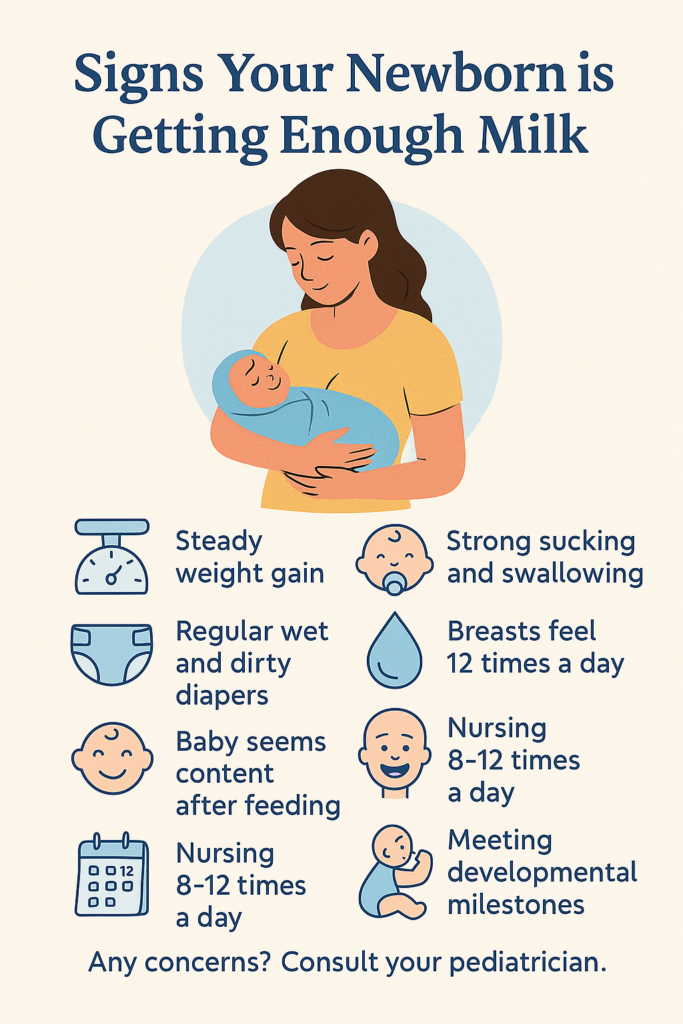One of the most common concerns among new parents is whether their newborn is getting enough milk—especially during those early days of breastfeeding or bottle-feeding. While babies can’t tell us in words, they do give us signs. Understanding these cues is essential for peace of mind and your baby’s health.
1. Steady Weight Gain
A newborn typically loses some weight in the first few days after birth but should regain it within 10 to 14 days. After that, steady weight gain is a key indicator that your baby is feeding well. Pediatricians usually expect a gain of about 5 to 7 ounces per week for the first few months.
According to the Centers for Disease Control and Prevention (CDC), tracking your baby’s weight through regular checkups is one of the best ways to confirm proper nutrition.
2. Regular Wet and Dirty Diapers
Diaper output is one of the easiest signs to monitor at home:
- Wet Diapers: By day 5, your baby should have at least 6 wet diapers per day.
- Dirty Diapers: In the early weeks, expect 3 to 4 stools a day. Breastfed babies may stool less frequently after the first month, which can still be normal.
3. Active and Alert After Feeding
A well-fed baby tends to be calm, content, and alert after feedings. If your baby seems drowsy or overly irritable after most meals, it might be worth consulting your pediatrician.
4. Strong Sucking and Swallowing
While feeding, listen for the sound of swallowing and observe rhythmic sucking. This indicates milk is being transferred effectively. A baby who latches well and shows jaw movement is usually feeding efficiently.
5. Your Breasts Feel Softer After Feeding
If you’re breastfeeding, your breasts should feel noticeably softer after a session, signaling that milk has been removed.
6. Baby is Nursing Frequently
In the first weeks, your baby may feed every 2–3 hours. Frequent feedings help establish your milk supply and ensure your baby is getting enough.
According to La Leche League International, it’s normal for babies to cluster feed—nursing more often during growth spurts or certain times of the day.
7. Your Baby is Meeting Developmental Milestones
When your baby is alert, gaining weight, and meeting key developmental milestones (like lifting their head, making eye contact, or smiling by six weeks), it’s a strong sign they’re getting adequate nutrition.

📥 Downloadable Checklist
Want a quick way to track if your baby is feeding well? Download our handy checklist to print or save on your phone.
📄 Download the Newborn Feeding Checklist (PDF)
Addressing Common Myths About Newborn Feeding
Even well-meaning advice from family and friends can sometimes be based on outdated or incorrect information. Let’s clear up a few of the most common myths surrounding newborn feeding:
Myth #1: Frequent Feeding Means You Don’t Have Enough Milk
Truth:
Newborns have tiny stomachs and grow rapidly. Feeding every 2–3 hours (or even more frequently during growth spurts) is completely normal and helps establish your milk supply. Frequent feeding is not a sign of low milk—it’s a sign of a healthy and developing baby!
🍼 According to the La Leche League International, cluster feeding (feeding more often in short bursts) is common and beneficial during developmental leaps.
Myth #2: Your Baby Should Sleep Through the Night Early On
Truth:
Most newborns wake often to feed. Waking up at night is biologically normal and helps babies get the nutrition they need. Expect your baby to wake for feeding every few hours in the first few months.
Myth #3: A Baby Should Always Finish the Bottle or Empty the Breast
Truth:
Just like adults, babies’ hunger levels vary. Some feedings will be longer than others. Forcing a baby to finish can lead to overfeeding. Watch for your baby’s hunger and fullness cues instead.
Myth #4: Formula is Necessary if Baby Seems Hungry After Breastfeeding
Truth:
Feeling like your baby is still hungry doesn’t automatically mean you need formula. It may just be time for another feeding session or a growth spurt. If weight gain and diaper output are on track, supplementation is usually unnecessary unless advised by a healthcare provider.
Guidance on When to Seek Help
While many feeding behaviors fall within the range of normal, there are times when it’s important to consult a healthcare provider. Trust your instincts—if something feels off, don’t hesitate to ask for support.
🩺 Contact a Pediatrician If You Notice:
- Little to no weight gain after two weeks of age
- Fewer than 6 wet diapers per day after the first week
- Very few or no dirty diapers for more than 24 hours
- Signs of dehydration (e.g., dry lips, sunken soft spot, no tears when crying)
- Baby is unusually sleepy, lethargic, or hard to wake for feedings
- Persistent vomiting or refusal to feed
- A yellowish tinge to the skin or eyes after the first week (sign of jaundice)
👩⚕️ Reach Out to a Lactation Consultant If:
- Baby has difficulty latching or staying latched
- You’re experiencing pain or cracked nipples
- You suspect low milk supply
- Baby seems frustrated at the breast or feeds for very long periods without satisfaction
- You hear clicking sounds or see milk leakage from the sides of the mouth while nursing
- You’re unsure whether your baby is getting enough milk despite frequent nursing
You can find professional lactation support via your hospital, pediatric clinic, or through certified consultants on sites like the International Lactation Consultant Association (ILCA).
Helpful Resources
Final Thoughts
Every baby is unique, and feeding experiences can vary. While the signs above are helpful, trusting your instincts and seeking professional guidance when unsure is always a good idea. You’re doing great—and your baby will thrive with your love and care.
Disclaimer: This article is for informational purposes only and does not substitute for professional medical advice. Please consult a licensed healthcare provider for personalized recommendations.



